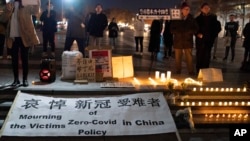News of protests in China and abroad has quieted down, but for Uyghurs living outside of China, the unprecedented message of solidarity is still fresh.
Chinese citizens living abroad have been organizing in-person gatherings and voiced support online for the Uyghur victims of a deadly apartment fire November 24 in Urumqi, the capital city of northwest China's Xinjiang region.
On Sunday, China announced it will ease its "zero-COVID" policies in cities including Urumqi. Authorities in the Xinjiang region's capital said that malls, markets, restaurants and other venues will reopen starting Monday, Reuters reported, ending a week of unprecedented protests against the hardships brought by the country's strict COVID policy.
'I personally apologize'
On Twitter, a video clip posted Thursday of a vigil at the University of California, Los Angeles shows an emotional Chinese youth speaking to a gathering of people.
"First of all, I personally apologize to all the Uyghurs present," the youth said, bowing to attendees. "I can't ask everyone to apologize, but I hope everyone will follow me and shout slogans."
He went on, chanting slogans such as "Stop concentration camps" and "Free Uyghurs."
Prominent Uyghur activists posted the video of the young man at UCLA and expressed their support.
Tahir Hamut Izgil, a Uyghur poet and activist based in Virginia, posted the video on his Twitter account Thursday.
"This student has a conscience, like it." Izgil said.
Abduweli Ayup, a Uyghur activist based in Norway, posted the video clip on his Facebook page, extending his respect to the Chinese youth.
"Friends who know this little brother are also invited to pass on my respect to him. It is very heartwarming and touching," Ayup said in his post. "I am in awe of your courage of not wearing a mask, and I admire your sincere apology. It also makes me hopeful for the younger generation of Chinese people."
Fire in Urumqi
Ten people died in the apartment building fire in Urumqi, according to the Chinese government, although local hospital employees told a U.S.-based Uyghur news outlet that the death toll was 44. Chinese officials did not mention the ethnicity of the victims in their official announcement, but Radio Free Asia confirmed that the victims were Uyghur.
Discontent had been simmering over China's "zero-COVID" policy even before the fire, and in the wake of the tragedy, protests erupted in cities such as Shanghai and Beijing, where people expressed frustration with the country's sporadic and lengthy lockdowns as it attempts to control the spread of the virus.
Many protesters also blamed China's COVID-19 policy for the deaths of the people in the apartment fire, saying fire escape doors were locked. A local fire official said the people inside the apartment were not aware of an alternate fire escape.
Some people in China posted videos on social media expressing their sadness and solidarity with Uyghurs killed in the fire.
"I believe that all districts, cities and counties in Xinjiang will gradually resume work and production soon," said Xinjiang Gu Weiwei, a user who has more than 90,000 followers on the Chinese video-sharing platform Douyin. "So at this moment, regardless of any ethnicity, we can help each other through mutual intentions and practical actions."
The user posted another video on Douyin on the same day that was seen by 220,000 people on the social media platform and drew nearly 40,000 comments in one week.
"I have a building with an area of 90 square meters in Shenshi community in Saybagh District, Urumqi," said the poster. "I am willing to provide free living and certain corresponding material assistance to the families affected by the fire."
Other Chinese citizens also posted videos in which they mourned the Uyghur victims of the fire and questioned the government's inability to save lives.
Inside the country, China's censors have been scrubbing and deleting posts of the protests to prevent the demonstrations from spreading.
China's treatment of Uyghurs
A report by the United Nations High Commissioner for Human Rights released in August found China's treatment of Uyghurs and other mostly Muslim groups in China's Xinjiang region may constitute crimes against humanity. The report mentioned "arbitrary and discriminatory detention." According to rights groups, China's repressive treatment of Uyghurs includes torture, sexual violence, forced sterilization and forced separation of families.
In 2021, the U.S. accused China of committing genocide.
Beijing has denied these allegations and said all measures taken in Xinjiang are not aimed at ethnicity or religion.
"The issues related to Xinjiang are not about human rights. They are about countering violent terrorism, radicalization and separatism," the spokesperson for China's Ministry of Foreign Affairs said in October.







